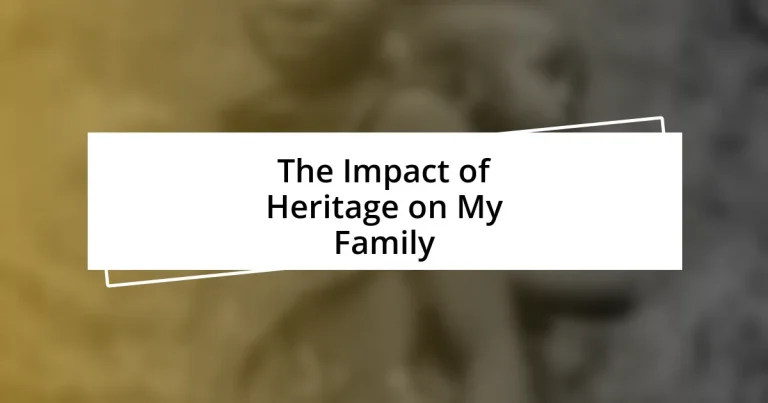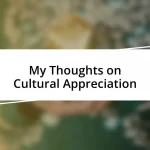Key takeaways:
- Family heritage encompasses stories, traditions, and values that create a strong sense of identity and belonging.
- Cultural practices and traditions serve to reinforce family bonds, foster pride, and maintain connections to ancestry.
- Ancestral narratives inspire personal motivation, shaping core values and influencing contemporary choices.
- Celebrating diverse family backgrounds enhances unity and appreciation for cultural identities, impacting future generations.
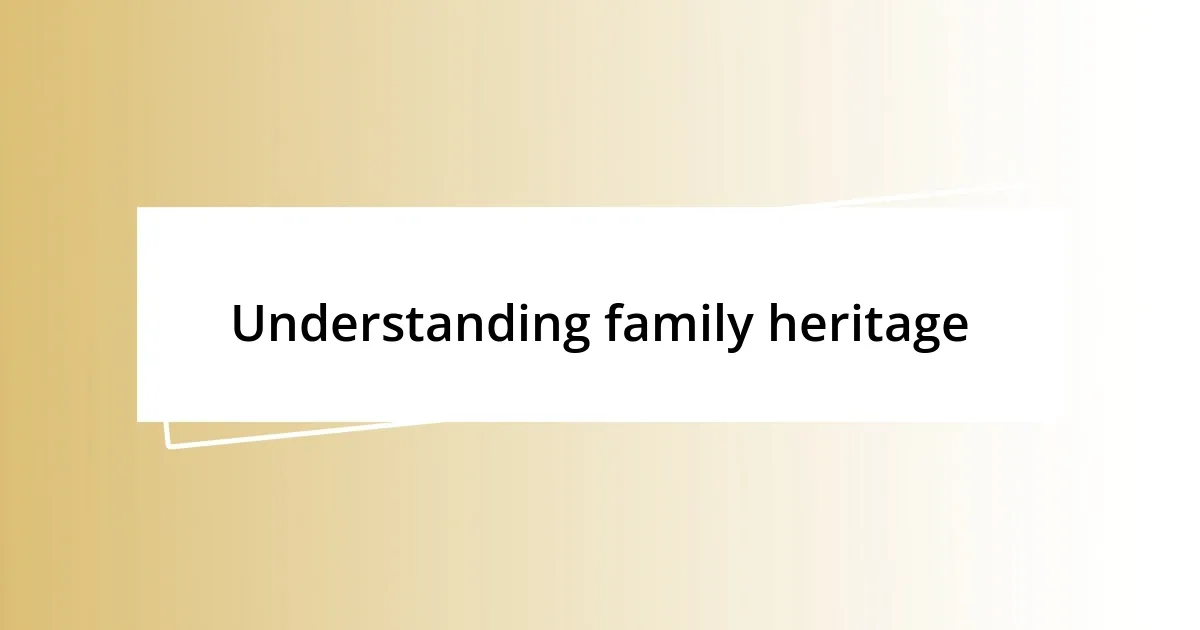
Understanding family heritage
Family heritage is more than just a collection of names and dates; it’s a tapestry of stories and traditions that shape who we are. I remember listening to my grandmother recount tales of her childhood, filled with laughter and resilience, each story weaving another thread into our family’s history. These narratives not only connect us to our ancestors but also provide a sense of belonging and identity that’s hard to find elsewhere.
When I think about my heritage, I often reflect on the holidays celebrated with family, where rituals passed down through generations turned ordinary moments into cherished memories. Have you ever felt that surreal connection to your roots during such celebrations? It’s a powerful reminder of how heritage can anchor us to our past while guiding our future, a lesson I’ve learned firsthand each time we gather around the dinner table, sharing recipes that have survived decades.
Additionally, heritage often reveals itself in unique traits and values instilled within a family. For instance, my family emphasizes the importance of education, believing it to be a key legacy from our forebears. I find myself pondering how much of my own ambition is rooted in this familial belief system. Could understanding these inherited values help us navigate our paths in life more effectively? It’s intriguing to consider how our heritage not only informs our character but also shapes our aspirations.
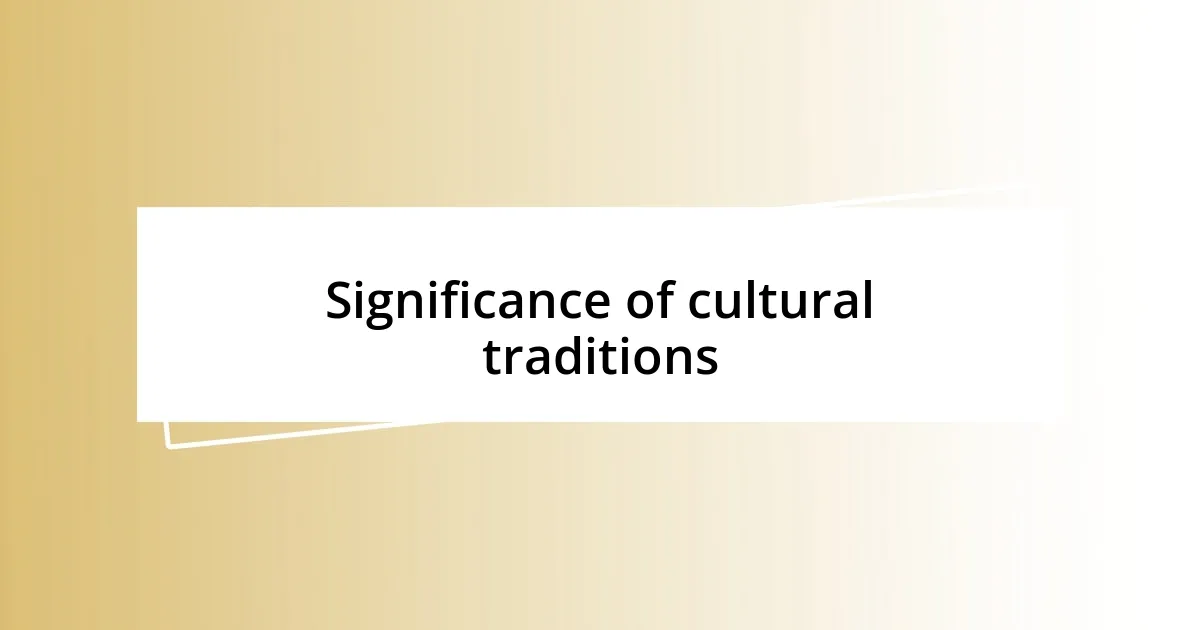
Significance of cultural traditions
Cultural traditions act as a thread that stitches together generations of family history. For instance, I vividly recall my mother teaching me the traditional dance from her homeland. Each movement felt like a direct connection to my ancestors, bringing their stories to life through rhythm and steps. This experience taught me that traditions foster not just celebration but also deep emotional ties to our heritage.
Moreover, cultural practices often serve as a vibrant reminder of shared values and beliefs within a family. I remember the smell of my grandmother’s special spices wafting through the air every holiday season, a ritual that united everyone in the kitchen. It’s more than just cooking; it’s about gathering, sharing stories, and reinforcing our collective identity during meaningful moments. Traditions like these create a sense of unity, reminding us of who we are and the legacy we carry.
Finally, the significance of cultural traditions expands beyond just family gatherings; they cultivate a sense of pride and respect for our ancestry. I often find myself reflecting on how these practices shape our worldview. For example, each cultural event I attend teaches me the importance of community and cooperation, values that have shaped not only how I relate to my family but also to the world around me. Those lessons serve as a guiding light as I navigate my own life, instilling a profound appreciation for where I come from.
| Aspect | Significance of Cultural Traditions |
|---|---|
| Connection to Heritage | Acts as a bridge to our ancestors, enriching our identity through shared experiences. |
| Value Reinforcement | Strengthens family values and beliefs, creating a cohesive family unit through rituals. |
| Sense of Pride | Fosters appreciation for one’s background, guiding personal development and worldview. |
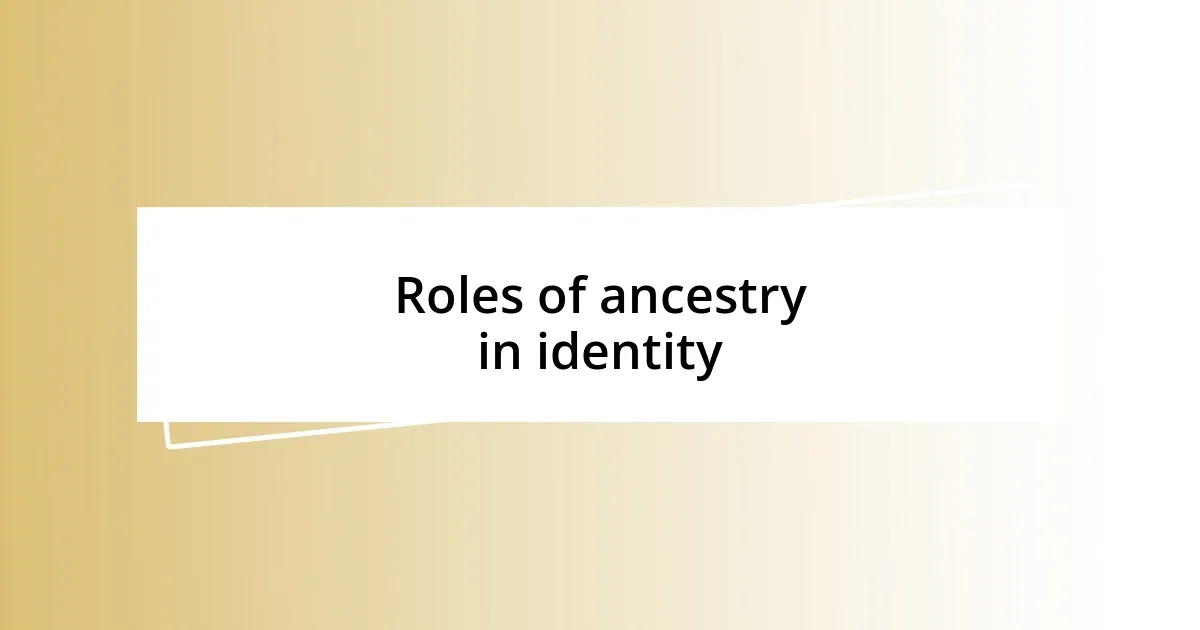
Roles of ancestry in identity
Ancestry plays a crucial role in shaping our identity by acting as a narrative backdrop for who we are today. I often find myself pondering how the stories of my ancestors resonate within me. For instance, my great-grandfather’s journey as an immigrant filled with both struggle and hope serves as my inspiration. Each time I face challenges, I hear his voice urging me to persevere, reminding me that my identity is deeply embedded in a legacy of resilience and determination.
Here’s a thought: our ancestry doesn’t just reside in the past; it thrives in our present as well. It can influence our choices and perspectives in meaningful ways. Some key roles of ancestry in identity include:
-
Sense of Belonging: Understanding our ancestry fosters deep connections, establishing a shared sense of belonging that links us to past generations.
-
Cultural Continuity: Ancestral narratives bridge generations, maintaining traditions that ensure our culture and values persist.
-
Value Formation: Legacy teaches us core values we might carry through our lives, shaping how we view success, family, and community.
-
Personal Motivation: I often draw strength from stories of bravery in my lineage, allowing their struggles to motivate me in my own pursuits.
Reflecting on these roles, I realize just how intricately my identity is woven into the fabric of my family’s lineage. Each revelation deepens my appreciation for where I come from and how it continues to influence my journey.
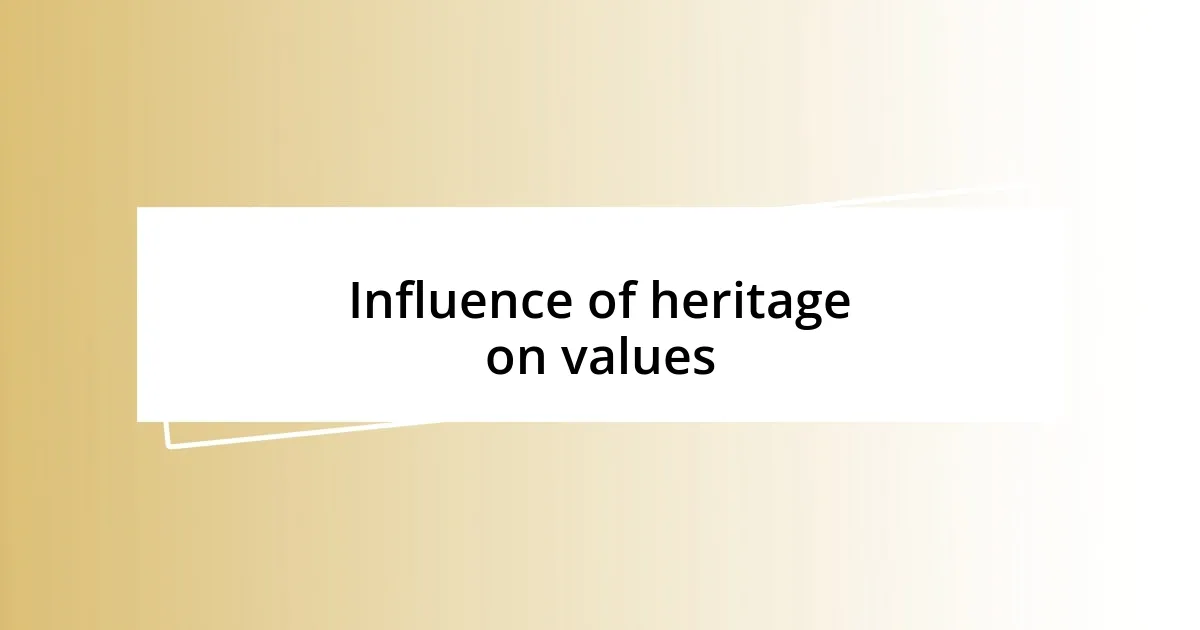
Influence of heritage on values
Heritage shapes our values in ways that are often profound and sometimes subtle. One vivid memory I have is of my father’s insistence on honesty above all else, a value that he attributes to his upbringing in a community where trust was paramount. Reflecting on this, I’ve come to understand that our family’s unwavering commitment to integrity isn’t just a personal value; it’s a cultural one rooted in our heritage. Have you ever noticed how certain lessons from our upbringing stick with us? For me, it’s moments like this that create a deep-rooted sense of purpose and direction in life.
The influence of heritage can also manifest in the way we approach family and relationships. I remember spending long summer evenings listening to my aunt share tales of our ancestors, emphasizing the importance of loyalty and support within the family. Those stories weren’t mere entertainment; they taught me that familial bonds are vital and should be nurtured. This reflection on my past explains why I prioritize family gatherings—I understand that these connections hold the key to my identity and emotional well-being.
I often think about how heritage encourages us to live with intention. One Christmas, my cousin and I took the initiative to organize a family reunion, wanting to honor our tradition of togetherness. As we put together the event, we could see our grandparents’ influence in our efforts to create a warm, welcoming atmosphere. It struck me that our actions were not just about reliving old customs; they were a testament to values like togetherness, kindness, and respect passed down through generations. Isn’t it amazing how our heritage not only shapes who we are but also inspires our choices today?
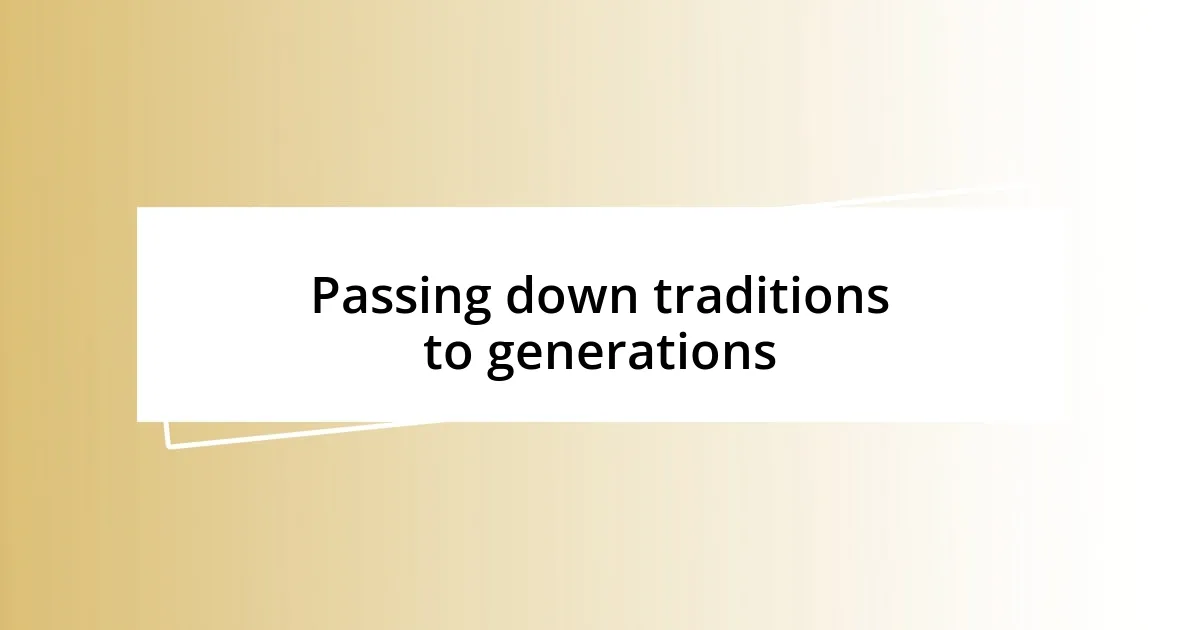
Passing down traditions to generations
As I look back on my childhood, I can vividly recall the annual family potluck where each relative brought a dish representing their heritage. Those meals weren’t just about food; they were an expression of love and tradition. I remember my grandmother’s famous lasagna, layered with stories of her Italian roots, and how it sparked conversations that connected us to our ancestors. I often wonder how this practice not only nourished our bodies but also our spirits, weaving a rich tapestry of shared experiences.
Every holiday also included the telling of old tales—my dad would recount how our family celebrated the harvest back in the old country. Those stories carried lessons about gratitude and resilience, reminding us that even in challenging times, our roots provide strength. It’s fascinating how these narratives shaped my perspective on hard work; they instilled in me a sense of duty and pride that pushes me to continue our traditions. Have you ever found yourself deeply moved by a story from your past that reshaped how you view the present?
One particular tradition that stands out in my mind is the dance my family performs at weddings—a dance passed down through generations. When it was my turn to participate in my cousin’s wedding, I felt a rush of emotions. As we danced, it wasn’t just about the movements; it was the laughter, the connection to those who came before me, and the promise to keep this tradition alive for future generations. I realized that every step we took on that dance floor was a testament to our shared heritage—a living expression of joy and unity that I hope my children will one day cherish. Isn’t it incredible how traditions, both big and small, form the threads that bind us to our family legacy?
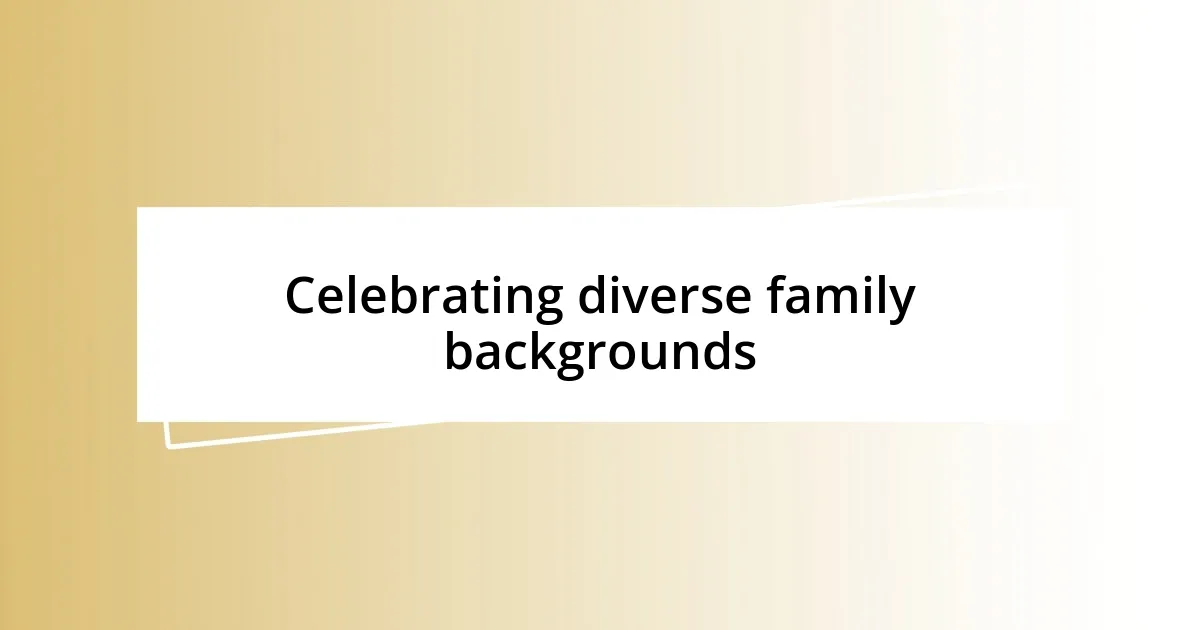
Celebrating diverse family backgrounds
Celebrating the diverse backgrounds of my family has always felt like a vibrant tapestry woven with unique threads. One Thanksgiving, we decided to embrace our multicultural heritage by creating a feast that highlighted all our traditions. My cousin brought a spicy curry from her Indian roots while my brother contributed his famous barbecue ribs, reflecting our Southern influences. Watching everyone share stories behind their dishes was a moment of connection that made me appreciate how our varied backgrounds enriched our celebration.
Each family gathering reveals a new layer of our diverse heritage. I still smile when I remember my uncle breaking into a traditional dance from his Jamaican lineage, much to everyone’s surprise. The room was filled with laughter, and soon, we all found ourselves trying to mimic his moves, creating a joyous chaos that filled the air. That spontaneity reminded me of the importance of embracing and displaying our cultural identities openly—it not only honored our past but also fostered unity and brought us closer together.
Sometimes, I wonder about the impact of these celebrations on future generations. As I watch my children excitedly learn the dances and recipes, I feel a sense of fulfillment. Will they grow up with the same appreciation for our diverse roots? I hope they will embrace their identities fully and continue to celebrate our family’s mosaic of backgrounds, ensuring that the stories and traditions never fade. How do you think such vibrant celebrations influence the way we perceive ourselves and each other?
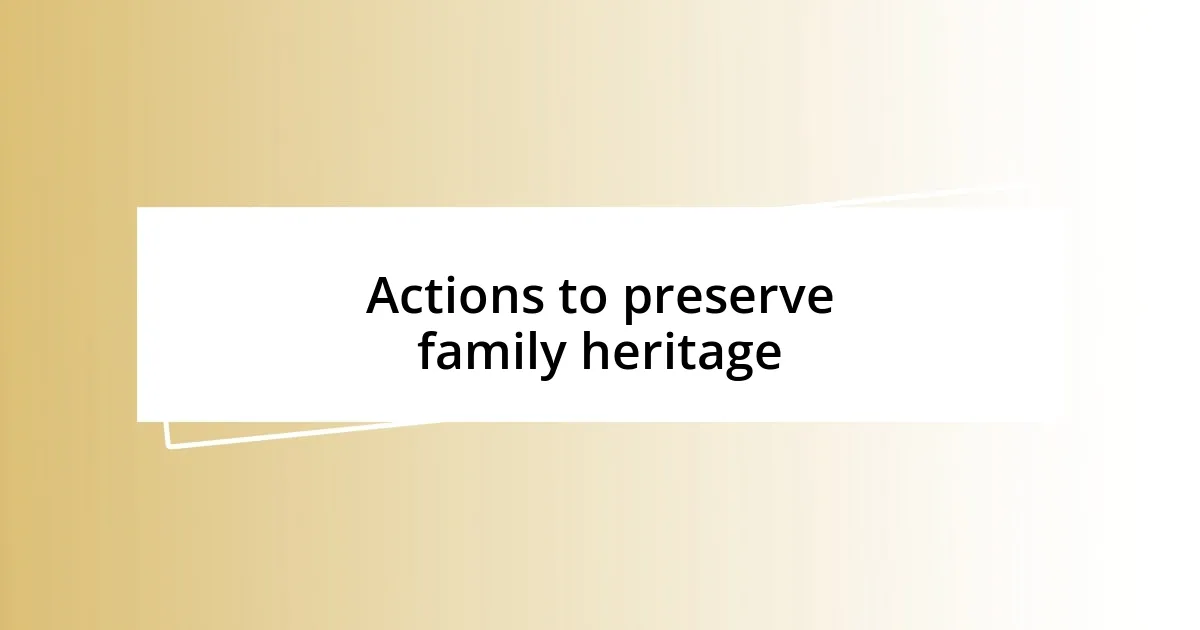
Actions to preserve family heritage
One practical action I’ve taken to preserve our family heritage is creating a family recipe book. After several family gatherings filled with laughter and cooking together, I realized how many cherished recipes were scattered across various homes. So, I reached out to relatives and asked them to share their favorite dishes along with the stories behind them. Not only did this project give me a lasting keepsake, but it also sparked heartfelt conversations about the past, making me realize how food can serve as a delicious bridge connecting generations.
In addition to documenting recipes, I believe that our family gatherings should include storytelling sessions. Last summer, during a quiet afternoon barbecue, we all gathered on the porch, and I asked my grandmother to share stories from her childhood. I found myself mesmerized by her tales of resilience during tough times and the traditions that shaped her early life. Listening to her not only enlightened me about my roots but also deepened my appreciation for the struggles and joys of our ancestry. Have you ever thought about the simple act of listening to an elder’s story as a powerful way to keep traditions alive?
Another meaningful action has been participating in cultural events that celebrate our heritage. I vividly recall attending a local festival honoring my ancestry, where cultural dances, music, and artisan crafts came together in a vibrant display. The moment I joined in for a dance that my parents taught me, I felt an exhilarating sense of connection. It was as if I was stepping into a living narrative, celebrating my past while creating new memories. How beautiful it is when we immerse ourselves in our heritage, cultivating a sense of pride that we can pass down.












